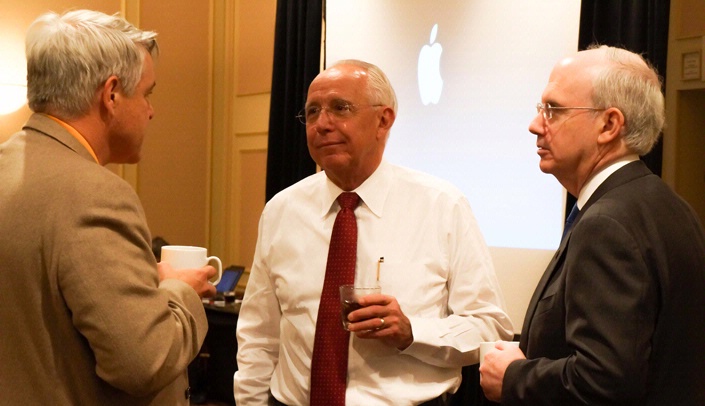Retreat speakers
The retreat also featured:
- Vin Capone, development executive with Apple Inc., who discussed the future of medical education and technology. His challenge: Talk to people in the language they understand,” he said, quoting Douglas Adam: “Anything that is in the world when you’re born is normal and ordinary and is just a natural part of the way the world works.” Capone demonstrated such health care-related apps as Hippocrates, which connects doctors and patients; ResearchKit, which could revolutionize medical studies; and Frog Dissection, a virtual dissection tool.
- Paul Grundy, M.D., president, patient-centered primary care collaborative, IBM’s Global Director of Healthcare Transformation. Dr. Grundy advocated that medical homes serve as the foundation for care delivery. “In an era of data, it’s where the data resides,” he said. “Our goal is to manage a population with data rather than respond to episodic care.” The Nebraska Medicine-Midtown Clinic’s collaborative team approach exemplifies this concept.
- Paul Umbach, founder and president of Tripp Umbach, who asked the group to envision Omaha as the “greatest mid-century city in 2050.” The medical center’s economic development plans for Saddle Creek Road – housing, retail, office and innovation space – can create a robust, sustainable midtown neighborhood, he said.
- Peter Kant, executive director, Center for Science, Technology, & Economic Development with SRI International, who discussed the role of universities in the innovation economy. “You have the fundamental building blocks to build a world-class innovation ecosystem,” he said.
“The best way to predict the future is to create it.”
Abraham Lincoln said it years ago, but it’s also the challenge UNMC Chancellor Jeffrey P. Gold, M.D., gave leaders of both UNMC and Nebraska Medicine at last week’s Strategic Planning Retreat.
“Let us envision a future for the community and not just for our own institutions,” he said. “The opportunities before us are huge.”
The daylong retreat featured five speakers who inspired the 200-member group, which included other health care systems in Omaha as well as community members, to look at how the medical center could lead the world, while grounded in the challenges facing academic health centers.
Darrell Kirch, M.D., president and CEO of the American Association of Medical Colleges (AAMC), discussed the “seismic” shifts academic medicine has faced including new payment systems, greater analysis of big data and a move toward more consolidated health systems.
Clinical enterprises often support the medical and research enterprise, so it’s important, he said, to consider how changes in clinical revenue might also impact the academic missions. Add to that increased demand for residency slots, and he asked: “How will we respond?”
Academic medical centers play a critical role in the U.S., Dr. Kirch said. Only 5 percent of all U.S. hospitals are AAMC-member teaching hospitals, yet they provide 23 percent of all clinical care and 37 percent of hospital charity care. They also provide such services as comprehensive cancer care, burn unit beds, level-one trauma centers and pediatric intensive care unit beds that are not often found elsewhere.
Dr. Kirch challenged the medical center to be among the nation’s leaders in providing solutions that improve health care costs, access and outcomes. “You’re in a better position than many to lead because you’re the public system for the state,” he said.
